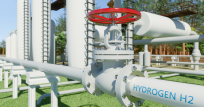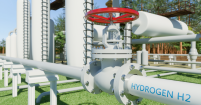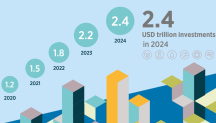

Removing Barriers for Green Hydrogen Deployment
Newsletter
According to IRENA’s World Energy Transition Outlook, hydrogen and its derivates are projected to make up 14% of global total final energy consumption by 2050 in a world aiming to stay under a 1.5-degree temperature increase. The eighth meeting of the Collaborative Framework on Green Hydrogen, therefore addressed the barriers stakeholders face when entering and building up supply chains, after having focused the demand side on its previous meeting.
At the IRENA Innovation Week, the IRENA Director-General Francesco La Camera underlined that "rapid green hydrogen scale-up lies on a systemic innovation approach beyond technology, which means we need innovative regulatory and policy frameworks, finance, and business models.” This statement was echoed at the Collaborative Framework meeting by Dr. Nawal Al-Hosany, Permanent Representative of the United Arab Emirates and the Co-facilitator of the Collaborative Framework, who underlined that it was “crucial to scale-up green hydrogen demand and supply at the same time, while also retrofitting and building up infrastructure.” She added that “the outcome of this Collaborative Framework should inform the COP28 discussions to accelerate action for the uptake of green hydrogen markets.”
The scene-setting presentation, included highlights from the Breakthrough Agenda report co-authored by IRENA and indicated that modest progress on hydrogen has been achieved in technology deployment, standardisation, policies to foster demand and financial instruments implementation in 2023, compared to the previous year.
Current challenges to financing large-scale hydrogen projects were addressed by Dolf Gielen, Hydrogen Lead at the World Bank, who recommended to focus on risk mitigation to reduce cost of capital for green hydrogen projects. He also highlighted the importance of focusing on supporting green hydrogen projects already in the pipeline to reach the Financial Investment Decision (FID) via implementation of financial instruments and business models widely replicable.
Magnolia Tovar, Global Director of Zero-Carbon Fuels, Clean Air Task Force, said that transporting green hydrogen long distances is costly and energy intensive, based on their analysis. She explained that transport of ammonia, rather than pure hydrogen, offered the cheapest pathway for transporting hydrogen molecules, but only if the ammonia is used as final product and not cracked back to hydrogen.
Electric Power Research Institute (EPRI)’s European H2Research Lead, María Jaén, elaborated on the challenges related to repurposing of existing, and construction of new pipelines for hydrogen transportation, including erosion and decrease in energy content. The gas transmission system operators (TSO) need to thoroughly assess the feasibility of using their existing gas network for hydrogen purposes, she concluded.
The opportunities of Green Hydrogen for developing countries were introduced by Smeeta Fokeer, Industrial Development Officer at UNIDO. The developing countries should focus on applications that create local value and develop the needed in-house skills for a hydrogen economy, she stated.
Sam Bartlett, Director of the Green Hydrogen Standard at the Green Hydrogen Organization, explained the importance of expanding sustainability standards for hydrogen beyond carbon emissions. He stressed that covering other environmental impacts and social aspects, as well as setting up appropriate governance structures was critical.
The panel concluded that given the ever-closer time horizon for setting up global green hydrogen supply, a coordinated effort to address all the mentioned aspects simultaneously in order to leverage their synergies, was necessary. Furthermore, the participants highlighted the importance of international collaboration for a successful implementation of national green hydrogen strategies and and the role of IRENA in that area.
The insights from this eight meeting of the Collaborative Framework on Green Hydrogen will be documented in a brief supplied as input to the COP28. The next meeting is scheduled for the first quarter of 2024. More information is available at the Collaborative Framework on Green Hydrogen webpage.




